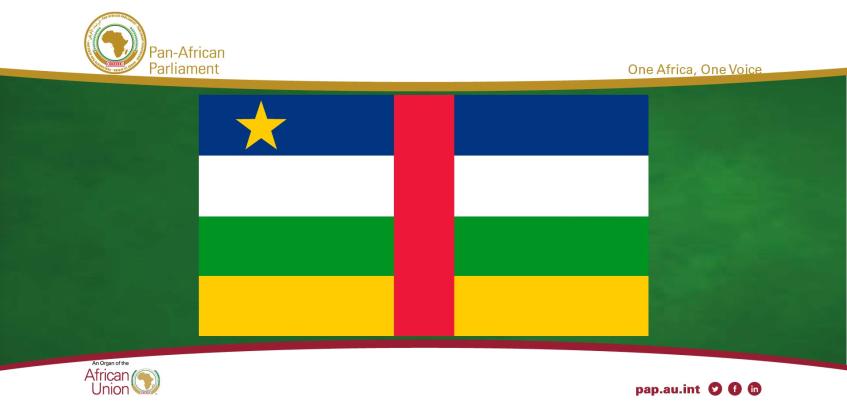The Central African Republic (CAR) has become the fifteenth (15th ) African Union (AU) Member State to ratify the Protocol to the constitutive act of the AU relating to the Pan-African Parliament (PAP), also known as the Malabo Protocol. This development is a major boost for the renewal aspirations of the Continental Parliament, taking it one step closer to full legislative powers.
The Malabo Protocol is intended to extend the powers of the Pan-African Parliament into a fully-fledged legislative organ of the Union. As it stands, its mandate extends to recommendations, consultation, and playing an advisory and oversight role for all AU organs pending the ratification of its protocol. It requires a minimum of 28 countries to ratify it before it comes into force.
CAR joins Benin, Cameroon, Chad, Equatorial Guinea, Gambia, Ghana, Madagascar, Mali, Morocco, Niger, Sahrawi Arab Democratic Republic, Sierra Leone, Somalia, and Togo as the African countries that have so far heeded the call to empower the continental Parliament.
The Pan-African Parliament is one of the nine AU organs with the mandate to promote economic and social integration through making laws. The Malabo Protocol was adopted at the AU Assembly of Heads of State and Government Summit in June 2014 in Equatorial Guinea.
The President of the Pan-African Parliament, Hon. Chief Fortune Charumbira has welcomed the development, indicating that more countries are rallying behind the drive to revive, renew, reposition, and reinvigorate Africa’s Parliament.
“We are delighted to have CAR on board, and we congratulate the country on this milestone. We encourage other AU Member States to heed the call as we aim for the 28 ratifications. This latest ratification vindicates our vision that true integration of the African continent will only be achieved through the involvement of the grassroots in the affairs of the AU, with a strong Continental Parliament as a cornerstone of these interactions,” said Hon. Chief Charumbira.
The ongoing institutional reforms of the AU have reaffirmed the strategic importance of the Pan-African Parliament within the AU architecture. A retreat on the status of the reforms, convened by the Permanent Representatives Committee (PRC) in Kigali last month, identified the Pan-African Parliament as one of the essential pillars to achieve the aspirations of Agenda 2063. This is in line with the Union’s aim to fully evolve into a people-centred institution and ensure full participation and representation of all citizens in the affairs of the AU.
-Ends-








